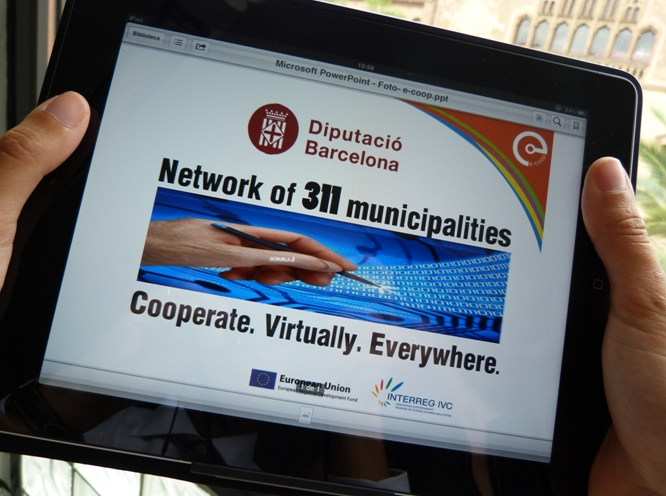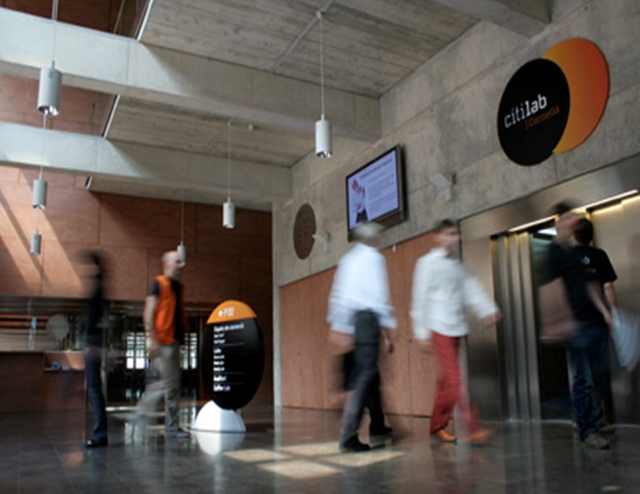Project Overview
European citizens do not participate equally in the Information society: in fact, the digital gap is moving down from infrastructures to uses. Based on this observation, local authorities in Europe have developed Digital Public Spaces (DPS) promoting e-inclusion.
Tags
oszkó, Cambridge County Council, e-Hungary point, library, study visit, datalocale, innovation, apps, gironde, Living Lab, digital democracy, good practice, Information Society Strategy, e-election, interregional, Cambridge, jyvaskyla, national digital archive, west transdanubia, west pannon nonprofit ltd
10.Barcelona Provincial Council (ES)
Who are we?
Barcelona Provincial Council is a local government of the province of Barcelona. The territory is divided in 311 municipalities, where the 73% of the Catalonia population live, distributed in an irregularly way, in small towns and in medium and large cities.
Our mission consists of providing services to our citizens, either directly or by giving support to municipalities, while optimizing resources and applying economies on a large scale.
In order to accomplish our objectives, we work with local councils, improving knowledge on local challenges and promoting a real network among municipalities when projects require more ambitious and global approaches.
One of the current strategic objectives from our organisation regarding society information is supporting the cities and towns development, where knowledge is a central objective of the local action. New technologies of communication and data transmission open up new possibilities for economic, social and cultural development in our society. However, at the same time, a new social and local discrimination can emerge. The objective of our institution is working to ensure that every citizen can rich access to equal opportunities, by supporting local government, developing the infrastructures and providing services that promote educational contents.

Where are we from?
The past
Barcelona Provincial Council was constituted in 1836, when the division of Spain in provinces was stated, according to “the Constitution of Cadiz” (1812). At the beginning it was executing competences in infrastructures, secondary education, and social welfare as well as carrying out an intermediate role between municipalities and the central government. The institution’s role evolved with the scope to modernise government structures up to 1924 when suddenly Provincial Councils were abolished by Primo de Rivera dictatorship. The approval of the new constitution in 1978 gives them birth again while recognising its local autonomy in addition to some specific competences always related to the development of local services.
The present
Regarding demography, in 2011, the population in the province of Barcelona is 5.529.099 people, representing a slight growth of 0.3% over last year. It is worth to highlight that in 2011 the foreign population resident in the Barcelona Province has fallen for the first time in 10 years.
According to last surveys, the unemployment rate during the first quarter of 2012 is 22% of the population; in our province, currently 1 out of 5 active people is unemployed.
In order to have an overview of our productive network, at the end of 2011 there were 178.049 companies registered in the province of Barcelona, 2.000 fewer companies than the previous year (-1.1%). Despite of these negative numbers, the decrease in number of companies in 2011 was much less intense than the preceding three years.

According to sectors:
· The construction sector continues to lose companies strongly (-12%) and in fact 80% of companies belonged to this sector in the province of Barcelona, closed down.
· The industrial sector also dropped their business, but to a lesser extent (-3%).
· Positive stabilization of the number of companies in the services sector (0.5% more than last year)
· Increase in the primary sector (5%).
A general overview of the current situation of Catalonia (2011) in terms of connectivity and access to internet provides the following data:
· 71% of households were having access to internet (3% more than in 2010). 21% of internet users has accessed through broad band mobile phones.
· 7 out of 10 catalan citizens commonly use computers (73%) and get daily connected to internet (76%), and almost 1 out of 4 has done internet commerce transactions.
· 45% of catalan citizens have got information from public institutions websites and 29% has filled out digital applications forms.
The future
Our organisation aims to go with Europe 2020 strategy, therefore, our purpose in the following decade is to generate smart, sustainable and inclusive growth: smart, through more effective investments at education, research and innovation; sustainable, by making decisive move towards a low-carbon economy; and inclusive, with a strong emphasis on job creation and poverty reduction. We are convinced about to do so we have to invest in understanding our environment in order to deliver better solution to our citizens by using innovation, creativity and entrepreneurship capacities.
We aim to become a knowledge society observatory: our smart citizens use smart phones which at the same time create smart communities, contributing to build smart cities. Considering this environment, our organisation will continue working on enhancing digital literacy, skills and inclusion at our territory.
Our organisation will continue delivering solutions to develop e-government focused on:
o providing citizens with better access to information and public services
o improving the quality of services
o increasing the participation of citizens on the decision making process, helping to develop democratic local governments.

Why are we here?
Ecoop’s project will provide us the opportunity to understand collectively the new challenges that our territories are facing in the knowledge society. To understand them better will allow us to respond them with more accurate and specific solutions. Sharing experiences within our project’s partners will definitely provide us better opportunities for improving our knowledge and developing services needed to build smart new territories in our region.
It is important to highlight within this project the need to implicate citizens along the process of producing services. Exchanging ideas and practices with our partners could help to develop new spaces for citizen’s participation. Within this direction, a collaboration with Citilab, an experimental centre for the dissemination of technological culture, is already being developed: a pioneering experiment built to demonstrate what citizens are capable to innovate and create as far as they are in an appropriate environment.
Our institution works to improve services focused on education, health and justice, improving access for the disabled people and people with fewer economic resources. Our organisation is already promoting the development of health services which can benefit either the patient as the health system, working on giving guarantee about its development and implementation becomes much wider.



